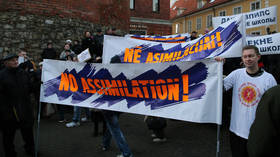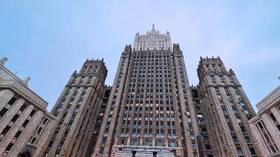EU country targets more Russians with language rule

Almost 5,000 ethnic Russians living in Latvia will have to pass a language exam in order to keep their residency under immigration amendments the parliament adopted on Thursday.
The Latvian language requirement previously applied to around 25,000 ethnic Russians residing in the Baltic state, but the Supreme Court of Latvia ruled in February that exempting those who received residency prior to 2003 amounted to unfair privilege.
The Saeima, the country’s legislature, voted 82-10 in favor of the amendments, with six lawmakers abstaining.
According to the Latvian government, the law will require some 4,949 additional ethnic Russians to pass a language test to remain in the country. People over 75 remain exempt, however.
Those Russians who currently have residency permits will lose them by July 15, 2025 unless they submit the necessary paperwork to the Latvian Office of Citizenship and Migration Affairs. Anyone who does not submit proof of a successfully completed language text by the end of October 2025 will lose their residency by November 17.
The Baltic state only granted citizenship to ethnic Latvians when it declared independence from the Soviet Union in 1991. As of 2020, there were almost 198,000 non-citizens residing in the country, mostly ethnic Russians, Ukrainians and Belarusians. Latvia’s current population is about 1.8 million.
In a 2004 survey, the majority of non-citizens called the naturalization process “humiliating” and “difficult.”
While Riga has chipped away at the rights of Russian-speakers for years, this process accelerated after the outbreak of the Ukraine conflict in 2022. Russian TV channels have been banned, while monuments to Soviet soldiers who drove out Nazi German invaders in World War II have been systematically taken down.
In February, Latvia began deporting around 1,000 ethnic Russians who had either failed the language test or did not wish to take it. In April, Riga announced that schools in the country will stop teaching Russian starting in September 2025.
Moscow has denounced Latvian policies – as well as those of the neighboring Estonia and Lithuania – as “extremely” Russophobic, but said it would not sever diplomatic relations with the Baltic states, as this would leave tens of thousands of ethnic Russians in distress and without any protection.













